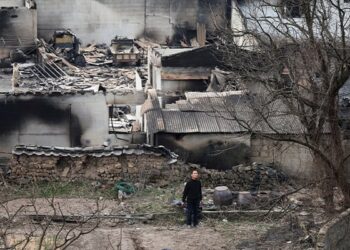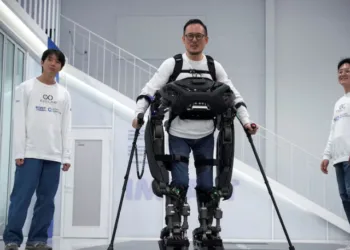SEOUL: In a courtroom appearance on Monday, ousted South Korean President Yoon Suk Yeol defended his controversial martial law declaration from late last year, asserting that it was “not a coup d’état.” He is facing a criminal trial for allegedly inciting an insurrection.
The martial law declaration lasted only about six hours before Yoon abandoned the plan under pressure from lawmakers and public protests. This incident has led to months of instability and ultimately resulted in the Constitutional Court’s decision to remove him from office for violating constitutional powers.
After departing his residence in a motorcade, Yoon entered the Seoul Central District Court clad in a dark navy suit and a red tie. He has consistently denied all charges against him.
During the trial proceedings, prosecutors argued that Yoon lacked the legal basis to impose martial law, claiming he intended to immobilize state institutions, including parliament. “The defendant rendered it impossible for constitutional organizations to perform their duties based on an unlawful order,” stated the prosecution.
Yoon, who previously served as the nation’s chief prosecutor, took the stand and vigorously countered the prosecutors’ claims. “Martial law does not equate to a coup d’état,” he contended.
He argued that the rules were necessary to inform the public about the opposition party’s attempts to hinder governance by impeaching over 20 officials, an action he deemed perilous. “This was merely a peaceful ‘message martial law’ to the nation… I anticipated this martial law would last no more than half a day to a day,” Yoon remarked.
Although he stated that he had communicated his intentions to former defense minister Kim Yong-hyun, Yoon alleged that military personnel misinterpreted the orders, possibly due to their previous training protocols.
Charges of Insurrection
Two senior military officers testified later that day. They claimed that a superior officer ordered them to deploy troops to forcibly remove lawmakers from parliament during Yoon’s martial law order. Yoon refuted this claim, denying that he issued such commands.
The martial law declaration, which aimed to eliminate what Yoon described as “anti-state” elements, was rescinded when parliamentary staff used barricades and fire extinguishers to stop special operations soldiers from entering the building, where lawmakers voted against the martial law measure.
The serious charge of masterminding an insurrection, faced by the impeached leader, could result in life imprisonment or even the death penalty, though no executions have occurred in South Korea for many years.
Yoon’s declaration on December 3 shocked the nation and created turmoil across various sectors, including society, the economy, and foreign policy, according to the Constitutional Court’s ruling for his ousting.
The upheaval has further highlighted the significant social divides between conservatives and liberals and has led to increased scrutiny on institutions and the military, which found itself in a dilemma regarding the enforcement of martial law.
The former president returned home on Friday after his term, greeted by throngs of conservative supporters as his motorcade passed by. Yoon has relocated back with his wife and pets to their apartment situated just a short distance from the Seoul court, where he previously achieved notable legal victories, including the conviction of another impeached president, Park Geun-hye.
Despite the ongoing legal challenges, he remains resolute and has promised to support his followers. Meanwhile, the opposition Democratic Party criticized him on Monday for being out of touch and failing to issue a genuine apology.
South Korea is set to hold a snap election on June 3, raising questions about whether Yoon will still have a political role to play.





